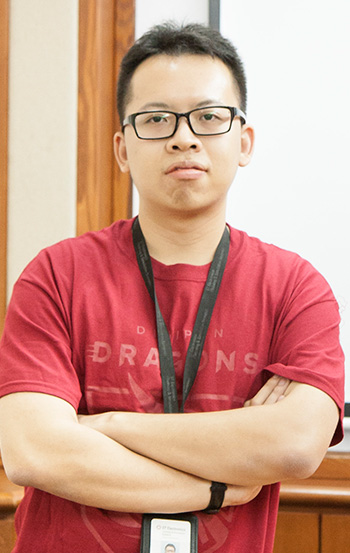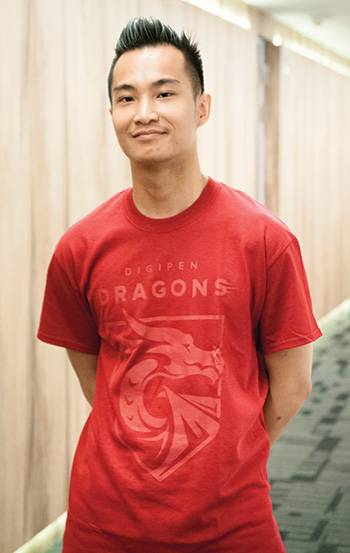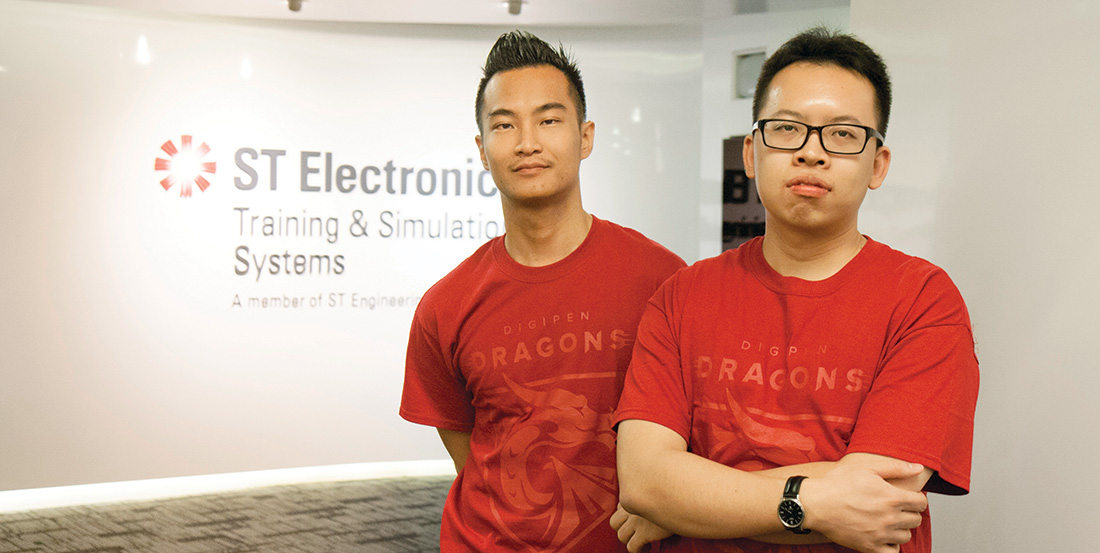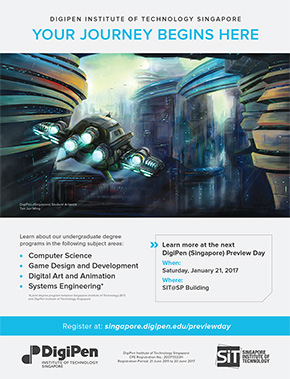Any gamer worth their salt can tell you that stunning graphics and engaging gameplay are the hallmarks of any good video game. But how do game developers learn the skills required to actually create those incredible images and experiences?
While many youths only marvel at the impeccability of the games they play, Terence Chow Shang Zhen took his fascination a step further by pursuing a Diploma in Games Design and Development at Singapore Polytechnic.
Terence, who had always been intrigued by game mechanics, knew that this field was his calling. Hence, when it came to choosing a degree program upon graduation, Terence looked no further than DigiPen (Singapore)’s Bachelor of Arts (BA) in Game Design program.
Fast forward to today, Terence is living his dream as a Senior Associate Engineer at ST Electronics. Interestingly, Terence is not the only ST Electronics employee to hail from DigiPen (Singapore). He also works with teammate and fellow DigiPen (Singapore) graduate Tan Rijian.
Like Terence, Rijian’s passion for games and animation meant that DigiPen (Singapore) was a natural and clear-cut choice. After graduating from Nanyang Polytechnic with a Diploma in Game Development & Technology (formerly Diploma in Digital Entertainment Technology (Games)), Rijian enrolled into DigiPen (Singapore)’s Bachelor of Fine Arts (BFA) in Digital Art and Animation program.
Acquiring Industry Proficiency
As part of the Naval Business Division, Terence and Rijian create and texture 3D models of ships, aircrafts and terrain buildings in maritime simulation projects. Their responsibilities include generating and manipulating virtual terrain data, such as terrain height maps and terrain material classifications; maintaining the team’s 3D asset repository; and presenting models to clients.
Besides working on client projects, the pair also has the exciting opportunity to conduct demos at public events. For instance, they showcased ST Electronics’ latest maritime defence innovations at the IMDEX Asia 2015.
Just like how power-ups in games give characters special abilities, an education from DigiPen (Singapore) gives students a valuable boost in their capabilities as artists, designers, and software engineers. Terence and Rijian have benefitted appreciably from the school’s curriculum, which incorporates a combination of lectures, hands-on projects and real-world learning.

Terence Chow Shang Zhen
Senior Associate Engineer
Bachelor of Arts in Game Design, DigiPen (Singapore)
“The BA in Game Design establishes a solid foundation in a whole spectrum of disciplines, from programming to traditional and 3D artwork. We also learn about game production, report writing and drafting of game design documents,” says Terence.
Rijian is quick to express his gratitude for the curriculum’s academic rigour and highly experienced faculty and staff. “The lecturers at DigiPen (Singapore) each possess unique skills and expertise – from concept art to 3D modelling. And while the group projects were tough, they trained us well to meet industry requirements and expectations. This reduces the culture shock we may feel upon entering the working world,” says Rijian.
Apart from Mr Palaniappan, another lecturer who inspires Wen Chang is Mr Lim Jet Wee. “Mr Lim encourages us to explore beyond the boundaries and confidently test out our ideas. He does not simply teach. A lot of relevant information outside of the curriculum is imparted to us by him. In fact, he is so passionate about teaching that he has formed a Facebook group comprising both past and current students, to have discussions regarding industry trends. His lectures are also very engaging,” Wen Chang shares.
“Rijian and Terence came in very well-prepared and eager to learn. Their strong fundamentals allowed them to quickly pick up our internal workflow and software tools, and they were able to start working on our projects in a short period of time with high quality work and content,” says their supervisor, Mr Melvin Lau, Assistant Principal Engineer with ST Electronics (Training & Simulation Systems).
As for Terence, he did a fruitful internship at DreamRocket, a rising Singapore-based mobile apps developer. There, he assumed the role of a Game Tester and was involved in database programming. “It was quite an eye-opener to the industry. Apart from learning about the various types of game testing, the experience also honed my communication skills,” shares Terence.
In addition, Terence and Rijian had the privilege of undergoing a three-month overseas immersion programme at DigiPen Institute of Technology in Redmond, Washington.
“It was a pleasant experience! The lecturers there are of a remarkably high calibre. They were also meticulous and specific when providing us with feedback,” says Terence.

Tan Rijian
Senior Associate Engineer
Bachelor of Fine Arts in Digital Art and Animation,
DigiPen (Singapore)
An Energising Environment
For those who share the passion evident in both Terence and Rijian, the duo strongly recommends DigiPen (Singapore) as the ideal institute to develop one’s strengths.
“Yes, it can be rather stressful, but it is through challenges that we grow and improve. After all, the digital industry is all about hard work and perseverance! Plus, the healthy competition amongst fellow schoolmates will really motivate you to aim high and succeed,” explains Rijian.
Terence also assures future students of the close-knit culture at DigiPen (Singapore). “Even after graduation, we are able to look to our lecturers for advice. Our alumni community even stays in touch via a Facebook group,” says Terence.
Convinced yet? Well, before you apply, Terence and Rijian offer some insights into the pre-requisites of their respective degree programs.
While computer science is not the main focus of the BA in Game Design program, the program does cover basic programming and scripting languages. As such, Terrence says it does not hurt to have some prior programming experience.
“As for the application procedure, it includes two essays – one is an artwork analysis and the other is related to game design,” says Terence. For the BFA in Digital Art and Animation program, Rijian says that passion, perseverance and determination are essential attributes in order for one to excel. He also offers his advice on how BFA graduates can boost their employment prospects.
“After you graduate, it is best to continue doing what you love. In doing so, you’ll be able to keep up with rapid technology and industry advancements,” Rijian says. “When assembling a portfolio, narrow down your work to specific skill sets or strengths. Avoid flooding your portfolio with every single project you’ve done. Employers often need to see what you are truly good at, so be sure to showcase your speciality.”


